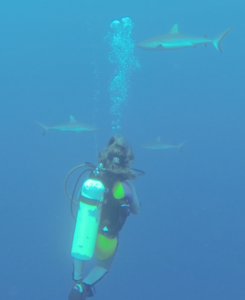A passion for the ocean and an activist-researcher for abandoned animals, Sarah Oxley Heaney works in the second field and has based her anthrozoology PhD project around the first. Sarah believes that more-than-human animals have intrinsic value and do not exist solely for our use; scuba diving with sharks, which is a passion she was fortunate enough to begin over 20 years ago. Additionally, Sarah is passionate about contributing her voice to those who fight for sharks, their aquatic environments and the effect their population decline has upon eco and planetary systems, through scholarly activism. Moreover, although Sarah is careful to not ‘speak for’ more-than-human animals, she does wish to add to literature reflecting more-than-human animal biographies and their lived experiences. Sarah can be contacted on sh750@exeter.ac.uk and www.kissingsharks.com
Scuba diving changes your life. If you fall in love with diving, it can capture your imagination and redirect your life substantially. Not only does the sensation of being submerged underwater sublimely alter your sensual worldview, but your perspectives of the nonhuman animals, landscapes even plants that can be encountered on our spinning planet undergo serious metamorphoses.
Since I learnt to dive, in the UK in 1996 I have been fortunate to dive in many locations around the world: UK, Palau, Egypt, Colombia, Maldives, Saudi Arabia, Sulawesi, Lembah Strait, Bunaken, Myanmar, Thailand, Egypt, Yap, Tobago, Malpelo and intend to explore many more places. My first encounter with a live shark was with non-captive sharks in the Maldives, where we saw many on most dives. I became mesmerised. ‘They are not interested’, ‘can they smell me?’, ‘will they come too close?’ The answer to the last question is in my dreams! Trying to dive with sharks has become a quest, to see them close in their own environment, but, in this quest have come to question their experiences of life, this is not, or should not, be about me wanting something from life without giving back.
The Maldives was my first international trip following cold-water dive training, sometimes in 6 deg C quarry water and a 99% of the time in poor-viz, cold water, big wind UK diving. Exhilarating and exhausting. We always rewarded ourselves with chips, mushy peas and a pint! UK diving can be incredible and I have been fortunate to have amazing, memorable dives with seals and other marine life, but there is a big difference between cold-water, drysuit, UK diving and encountering the Maldives tropical diving! The scenery above and below water took my breath away. I knew very little about tropical marine life on that first trip and seeing such colour and abundance (pre 1998 coral bleaching events) I was hooked! I realised that seeing sharks on that trip did not evoke the emotion that many people seem to feel about sharks, i.e. somewhere on the apprehensive to terrified scale, in fact to see any was incredibly exciting.
Without too much consideration for the sharks I was to encounter, I dived in a tank in the UK with tiger sharks. For my own entertainment, I am rather ashamed now, but, it helped lead me to this PhD, so perhaps there can be a giving back to those sharks’ free entertainment-for-humananiamals-labour. What I remember most was that the sharks were not at all interested in me. They were big, 8ft long perhaps? They swam over my head, with the distinctive ragged teeth, without looking at me. I had to duck a few times so they didn’t bump into me. It struck me, although this was an amazing experience their disinterest in me and their surroundings seemed unnatural. I am not sure what I expected at the time, perhaps I thought they would come over, ‘investigate’ this new presence but they just passed by. Were they displaying learned helplessness (Seligman 1972)? I don’t know, I don’t know enough about shark behaviour, but, I do know, in the oceans they keep their distance. They do not sneak up and bite people in the stereotypical way the media portrays. At that time I didn’t consider the sharks’ origins, although I do now as I wonder what their experience of life has been, how mentally and physically comfortable or uncomfortable they are. What are their biographies, their journeys to that tank? Their disinterest however, was not only a surprise and but an instant comfort to me as a diver as I immediately felt I would never have a fear of diving with sharks. I am still ambivalent about this experience, my perception of sharks was instantly cemented, possibly to the benefit of shark species in some form of conservation awareness, but at what cost to the shark? My research, in some ways, is payment to those unknown sharks. To offer some sort of recompense in trying to tell the stories of their Selachimorpha families.
Eventually, on our diving expeditions, my husband and I sought out diving with sharks, taking long, gruelling journeys to reach famous global dive sites. Simultaneously, I embarked on a journey of understanding, becoming aware of the dangers faced by sharks globally, as species and as individuals. My undergrad study taught me about oceanography; MA in Environment, Policy and Society introduced me to ethics. My MA in Anthrozoology continued that teaching and gave me tools to learn how to tell the stories of animals, how sharks and human-animals shape our planet and to look at shark-human encounters through an symbiotic-ethical, anthrozoological lens. These passions, diving, sharks, anthrozoology, the human effect on our planet and my believe that animals have intrinsic value, overlap and the intersection creates a space for my PhD research.
So now, in my second year of my part-time anthrozoological PhD with some shark-reading under my belt I begin to reach out and reveal my intended research plan. Watch this website or @kissingsharks on social media for the next stage in my multispecies ethnographic journey!

